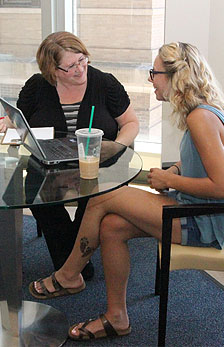Rehabilitation and Participation Science
Program in Occupational Therapy
 This fall, the Community Practice is launching a new service aimed at providing comprehensive recovery support for adolescents following substance abuse. Theresa Henry, MSOT, OTR/L, a clinical specialist for the practice and 1991 Program alumna, will serve as lead clinician. This new service line is more than just a professional passion for Henry – it’s a personal one, too.
This fall, the Community Practice is launching a new service aimed at providing comprehensive recovery support for adolescents following substance abuse. Theresa Henry, MSOT, OTR/L, a clinical specialist for the practice and 1991 Program alumna, will serve as lead clinician. This new service line is more than just a professional passion for Henry – it’s a personal one, too.
After watching her son struggle with the daily challenges of occupational performance throughout his recovery from substance abuse, and listening to the shared concerns of countless other families facing similar circumstances, she committed her personal and professional experience to developing a comprehensive program. We sat down with Henry to discuss the clinic’s new services.
Tell us a little bit about yourself and your background.
in this high risk population?
How are you spreading the word about these services?
The goal is to reach individuals in the places/environments where they need to function. I continue to connect with agencies and service providers who are currently “holding the baton” and seeking to find resources to “bridge the gap” following substance use intervention. The ultimate goal of the program is to provide supports that will best prepare individuals to maintain sustained recovery in the environments where they need to function. For adolescents, that includes high school or college. For young adults that includes a variety of places in the community where “life occurs.” Typically, the adults and administrators in community settings are overwhelmed with their own objectives they need to meet, and are in need of partnering support. I want them to know how this program can make their jobs easier, and how I can partner with them in order to help these young people successfully reintegrate into their settings.
Every client is unique, but tell me about some of the things you work on with a client as part of the treatment plan.
This program is designed to offer a comprehensive assessment of occupational performance needs, as well as underlying factors that may be impacting functioning. We discuss current strengths and barriers to success, and develop a targeted action plan. Initial focus is on self-awareness, and implementation of instructional strategies to meet client-determined goals. Specific intervention modules are designed to address gaps in skills related to health/wellness, self-regulation, emotional resiliency, instrumental activities of daily living (home management, budget/finance, community access), leisure activities, educational supports, pre-vocational training, interpersonal relationship dynamics (social perceptions), resource identification and self-management tools and strategies.
What are your hopes for this program?
As the client population grows, I will add targeted group experiences to help adolescents further grow in skill development, alongside peers who are faced with similar challenges. These groups may include specific life skills of interest, such as cooking, vocational exploration or technology/study skills. In addition to supporting young people in recovery, and the community partners that support
their daily needs, I work with the entire family. Our story started with the pain of parents in distress. I remember all too clearly how the stresses of early recovery impact entire family dynamics. I offer groups that support parents and/or siblings in their understanding of recovery dynamics and reestablishing healthy family relationships.
What do you most want people to know about this program?
Sobriety is the first step in the recovery process. When an individual is ready for their next step, community-based occupational therapy is positioned to be a comprehensive wrap-around support to meet each client right where they are at in their recovery journey. The service gives these young people the very best opportunity to feel confident and competent in their ability to take care of themselves and remain sober.
For more information about this program, visit ot.wustl.edu/substanceabusenextsteps.
We welcome inquiries from prospective students, potential collaborators, community partners, alumni and others who want to connect with us. Please complete the form below to begin the conversation.
Schedule an Info Session
We are excited that you are considering applying to the Program in Occupational Therapy at Washington University. Please join us for a Zoom Information Session for either our entry-level MSOT or OTD degrees or our online Post-Professional OTD. Current faculty members will discuss the degree program and answer any question you may have. We are offering these sessions on the following days and times. The content is the same for each one, so you only need to sign up for one.
Upcoming ENTRY-LEVEL Degree ZOOM Info sessions:
Schedule an Entry-Level Info Session
Upcoming PP-OTD Degree ZOOM Info session: